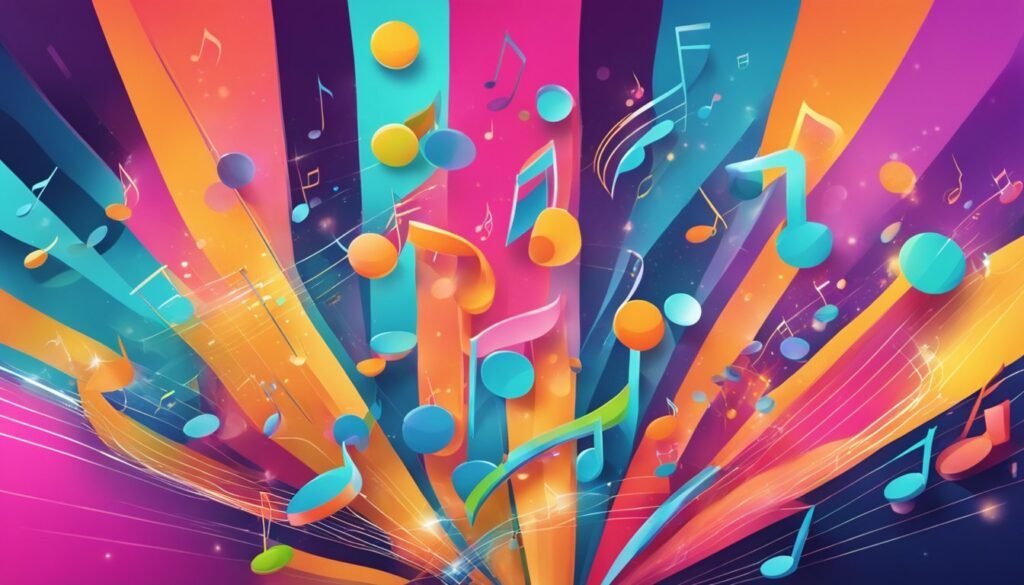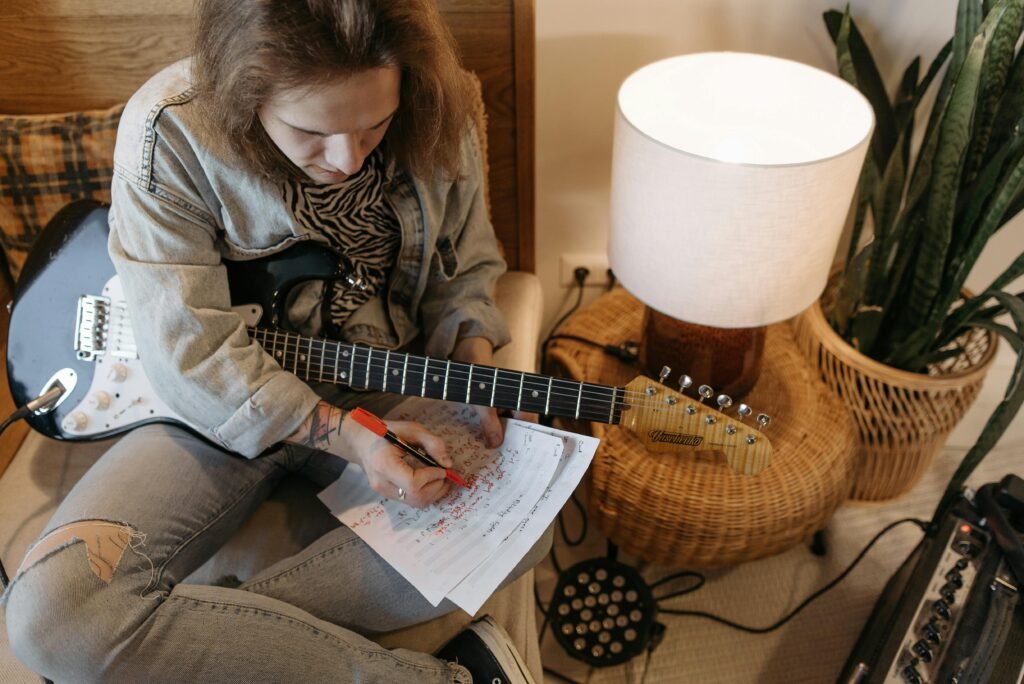Table of Contents
If you’re a musician or composer, you may be wondering how artificial intelligence (AI) can help you create music. AI has come a long way in recent years, and it’s now possible to use AI algorithms and software to convert sound to notes, write notes with AI, transform MIDI to notes, and even transcribe real-time sound to notes. In this article, we’ll explore the tools and techniques available for AI-assisted music composition, the ethical and creative considerations involved, and the future of AI in the music industry.

One of the most exciting aspects of AI music composition is the ability to use predictive text and AI-driven harmony and melody suggestions to create new compositions. These tools can be customized and personalized to fit your compositional style, and they can help you break out of creative ruts or writer’s block. Additionally, AI-assisted music composition software is becoming increasingly popular, and we’ll take a closer look at some of the most popular options on the market.
Of course, as with any new technology, there are ethical and creative considerations to keep in mind. For example, who owns the rights to AI-composed music, and how can we balance human creativity with machine assistance? We’ll explore these questions and more in the following sections, as well as take a look at the future of AI in the music industry.
Key Takeaways
- AI is transforming the music composition process, with tools for converting sound to notes, writing notes with AI, transforming MIDI to notes, and transcribing real-time sound to notes.
- AI-assisted composition software is becoming increasingly popular, and can be customized to fit your compositional style.
- Ethical and creative considerations, such as ownership and attribution of AI-composed music, must be taken into account as AI becomes more prevalent in the music industry.
The Evolution of Music Composition with AI

Historical Context and Technological Advances
Music composition has been a human endeavor for centuries, with composers using their creativity and skills to produce works that continue to inspire and move us. However, as technology has advanced, so too has the way we approach music composition. In recent years, the use of artificial intelligence (AI) has become increasingly prevalent in the music industry, allowing for new and innovative methods of music composition.
AI music generation has its roots in the early 1950s, with the development of the first computer music program by Max Mathews. Since then, there have been significant advancements in the field of AI, particularly in the development of algorithms that can analyze and interpret musical data. Today, AI algorithms are capable of analyzing a wide range of musical inputs, from traditional sheet music to audio recordings.
Role of AI in Modern Music Production
The use of AI in modern music production has opened up new possibilities for composers and producers alike. AI-driven software solutions (Kanglio, AudioScore) can now convert audio recordings to sheet music, provide harmony and melody suggestions, and even predict the next note in a composition. Additionally, AI-assisted music composition tools can now be integrated into traditional composition workflows, allowing for a more streamlined and efficient process.
One such tool is AIVA (Artificial Intelligence Virtual Artist), which uses AI algorithms to generate original compositions. AIVA has been used to create music for films, commercials, and even symphonies, demonstrating the potential of AI in the music industry.
Looking to the future, it is clear that AI-driven music creation will continue to play an increasingly important role in the music industry. Emerging technologies and innovations will likely lead to even more sophisticated AI algorithms and tools, potentially revolutionizing the way we approach music composition.
AI Algorithms and Sound Analysis

Transforming Sounds into Musical Notations
AI algorithms for sound analysis have made it possible to convert audio recordings into sheet music. These algorithms use machine learning techniques to analyze the different components of a sound wave, such as pitch, duration, and intensity, and then map them onto a musical staff. This process is known as transcription and is an essential step in converting sound to notes.
There are several software solutions available for audio to sheet music conversion, such as AnthemScore, and ScoreCloud. These tools use AI algorithms to detect notes, chords, and rhythms in the audio file and then create a corresponding music notation. However, the accuracy of these tools can vary depending on the complexity of the music and the quality of the audio recording.
Enhancing Sound Quality with AI Tools
AI algorithms can also be used to enhance the sound quality of recordings. One such tool is the AI-driven audio restoration software, which can remove unwanted noise and other distortions from audio recordings. This tool uses machine learning algorithms to analyze the audio wave and then applies a series of filters to remove any unwanted sounds.
In addition, AI algorithms can be used to create new sounds and music. For example, Google’s NSynth is an AI-powered synthesizer that can generate new sounds by combining the characteristics of different instruments. This tool can create unique and innovative sounds that may not be possible with traditional instruments.
Overall, AI algorithms have revolutionized the way we analyze and manipulate sound. They have made it possible to convert audio recordings into sheet music, enhance the quality of recordings, and even create new sounds and music.
Creative Process in AI-Assisted Composition
In AI-assisted music composition, the creative process involves a delicate balance between human creativity and machine learning. While AI algorithms can generate melodies and harmonies, it is up to the human composer to shape these ideas into a cohesive musical composition.
Balancing Human Creativity and Machine Learning
The key to successful AI-assisted composition is finding the right balance between human creativity and machine learning. AI algorithms can generate endless possibilities for melodies and harmonies, but it is up to the human composer to select and refine these ideas into a finished piece of music.
One approach is to use AI algorithms as a source of inspiration, allowing them to generate ideas that the human composer can then build upon and refine. This approach allows for a collaborative process between human and machine, with each contributing their unique strengths to the creative process.
Innovative Approaches to Melody and Harmony
Innovative approaches to melody and harmony are at the forefront of AI-assisted composition. AI algorithms can analyze vast amounts of musical data to identify patterns and generate new ideas for melodies and harmonies.
One approach is to use predictive text algorithms to generate melodies based on a given set of parameters, such as key and tempo. These algorithms can generate melodies that are both unique and coherent, providing a starting point for the human composer to build upon.
Another approach is to use AI-driven harmony and melody suggestions to guide the creative process. These suggestions can help the human composer to explore new musical ideas and push the boundaries of traditional composition.
In conclusion, AI-assisted composition is an exciting area of innovation in the music industry. By finding the right balance between human creativity and machine learning, composers can use AI tools to generate new ideas and push the boundaries of musical composition.
Artificial Intelligence in Music Production
The Impact of AI on Music Producers and Artists
Artificial intelligence has brought about a significant impact on the music industry, particularly in music production. With AI tools and software, music producers and artists can now create music faster and more efficiently. AI can analyze and interpret vast amounts of data, making it easier for producers to identify patterns and trends in music production.
AI tools have also made it possible for producers and artists to experiment with new sounds and styles. For instance, AI-driven harmony and melody suggestions can help producers come up with unique and innovative compositions that would have been challenging to achieve without AI assistance.
However, the use of AI in music production has raised concerns about the future of human creativity in music. Some argue that AI tools and software may lead to a homogenization of music, with producers and artists relying too heavily on AI-generated sounds and styles.
AI Tools and Software for Producers
AI tools and software have become increasingly prevalent in the music industry, with many producers and artists using them to enhance their music production process. For instance, AI algorithms for sound analysis can help producers identify the key and tempo of a song, making it easier to create remixes or mashups.
Software solutions for audio to sheet music conversion have also become popular, allowing producers to quickly convert audio files to sheet music. These tools have improved in accuracy over the years, making it easier for producers to transcribe complex pieces of music accurately.
In addition, AI-assisted music composition tools have become increasingly popular, providing producers with a range of options for generating new sounds and styles. These tools can help producers create music faster and more efficiently, allowing them to spend more time on the creative aspects of music production.
Overall, AI tools and software have had a significant impact on music production, making it easier for producers and artists to create high-quality music. However, as with any technology, there are concerns about the impact of AI on human creativity and the future of music production.
Intellectual Property and Ethical Considerations

Copyright and Ownership Issues in AI-Composed Music
As AI algorithms become more advanced, they are increasingly being used to create original music compositions. However, this raises questions about who owns the rights to the music that is created. In most cases, the copyright for AI-composed music is owned by the person or organization that created the algorithm used to generate the music.
In some cases, the music may be considered a collaborative work between the human and the machine, which can complicate ownership and attribution. It is important for musicians and AI developers to establish clear agreements regarding ownership and usage rights before beginning any collaborative projects.
Ethical Boundaries and Artist Collaboration
While AI-assisted music composition can be a powerful tool for creativity, it also raises ethical questions about the role of the artist in the creative process. Some argue that relying too heavily on AI technology can lead to a loss of artistic control and originality.
On the other hand, others argue that AI can be a valuable tool for expanding creative possibilities and collaborating with other artists. It is important for musicians and AI developers to consider the ethical implications of AI-assisted composition and to establish clear boundaries and guidelines for collaboration.
In conclusion, as AI technology continues to advance, it is important for musicians and AI developers to consider the ethical implications of AI-assisted composition and to establish clear agreements regarding ownership and usage rights. By working together and respecting each other’s creative contributions, artists and AI algorithms can create truly innovative and original music compositions.
Integration and Accessibility of AI in Music
From Amateurs to Professional Composers
AI music composition tools are becoming increasingly accessible to musicians of all levels. With the help of AI algorithms, even amateurs with no formal music education can create complex compositions. For example, AI-powered music apps like Amper Music and AIVA can assist users in composing original music by providing pre-made loops, suggesting melodies and harmonies, and even generating entire tracks.
Professional composers can also benefit from AI-assisted composition tools. These tools can help composers overcome creative blocks, generate new ideas, and speed up the composition process. AI algorithms can analyze existing music to generate new compositions in a similar style, or even create entirely new musical genres.
Breaking Entry Barriers with AI Music Apps
AI music apps are also breaking down entry barriers for musicians who may not have access to traditional music education or expensive instruments. By using affordable software and hardware, musicians can create high-quality music without breaking the bank.
AI music apps can also democratize the music industry by allowing independent artists to create and distribute their music without the need for a record label. With the help of AI algorithms, musicians can create professional-quality tracks from their home studios and distribute them to a global audience through platforms like Spotify and Apple Music.
In conclusion, AI music composition tools are becoming more accessible to musicians of all levels, from beginners to professional composers. AI-powered music apps are breaking down entry barriers and democratizing the music industry, allowing independent artists to create and distribute their music more easily than ever before.
The Future of AI in the Music Industry
Predictions and Emerging Trends
As AI technology continues to advance, it is expected to have a significant impact on the music industry. One emerging trend is the use of AI to create personalized music recommendations for listeners. With the vast amount of music available on streaming platforms like Apple Music and Spotify, AI algorithms can analyze a listener’s music preferences and create custom playlists based on their individual tastes.
Another prediction is that AI will become increasingly involved in music production, from composition to mastering. AI-driven software is already being used to generate music in various genres, and as the technology improves, it is likely that AI-generated music will become more prevalent.
Expansion of AI in Genres and Distribution Channels
As AI technology continues to evolve, it is expected to expand into various music genres and distribution channels. AI-generated music has already been used in various commercial applications, such as advertising and video games. It is likely that this trend will continue, and we will see more AI-generated music in films, TV shows, and other media.
Additionally, AI is expected to play a larger role in the distribution of music. With the increasing popularity of streaming services, AI algorithms can analyze listener data to determine which songs are most popular and which artists are trending. This information can be used to inform marketing and distribution strategies, allowing music to reach a wider audience.
Overall, the future of AI in the music industry is promising. As the technology continues to advance, we can expect to see more personalized music recommendations, AI-generated music, and innovative distribution strategies. However, it is important to balance the use of AI with human creativity and artistic expression, ensuring that the music industry continues to thrive and evolve.
Frequently Asked Questions
What AI algorithms are effective for analyzing sound and converting it to sheet music?
There are various AI algorithms that are effective for analyzing sound and converting it to sheet music, including machine learning algorithms like neural networks and decision trees. These algorithms can analyze the pitch, tempo, and other characteristics of sound to accurately transcribe it into sheet music. Some popular software solutions that utilize these algorithms include AnthemScore, ScoreCloud, and AudioScore.
How do predictive text and AI-driven suggestions enhance music composition?
Predictive text and AI-driven suggestions can enhance music composition by providing real-time suggestions for melody and harmony based on the user’s input. These tools can help composers explore new musical ideas and create more complex compositions. Some popular software solutions that utilize these features include Amper Music, AIVA, and Humtap.
Can MIDI data be accurately transformed into sheet music using AI?
Yes, MIDI data can be accurately transformed into sheet music using AI. The process involves interpreting the MIDI data and transcribing it into sheet music notation. There are various software solutions available that can perform this task with high accuracy, including MuseScore, Sibelius, and Finale.
What technologies are available for real-time sound to notes transcription?
There are several technologies available for real-time sound to notes transcription, including machine learning algorithms and digital signal processing techniques. Some popular software solutions that utilize these technologies include Transcribe!, Amazing Slow Downer, and Capo.
What are some popular AI-assisted music composition tools currently in use?
There are several popular AI-assisted music composition tools currently in use, including Amper Music, AIVA, and Humtap. These tools utilize machine learning algorithms to provide real-time suggestions for melody, harmony, and rhythm, and can help composers create more complex and innovative compositions.
What are the ethical implications of using AI in music composition regarding ownership?
The ethical implications of using AI in music composition regarding ownership are still being debated. Some argue that the use of AI in music composition challenges traditional notions of authorship and raises questions about who owns the rights to AI-generated music. Others argue that AI can be used as a tool to enhance human creativity and should be treated as a collaborative partner rather than a replacement for human composers.
More Information
The World’s First Album Composed and Produced by an AI Has Been Unveiled
How Artificial Intelligence (AI) Is Helping Musicians Unlock Their Creativity
AI in the 1980s and Beyond: An MIT Survey
‘He touched a nerve’: how the first piece of AI music was born in 1956
ALGORITHMIC MUSIC – DAVID COPE AND EMI
Related Content



